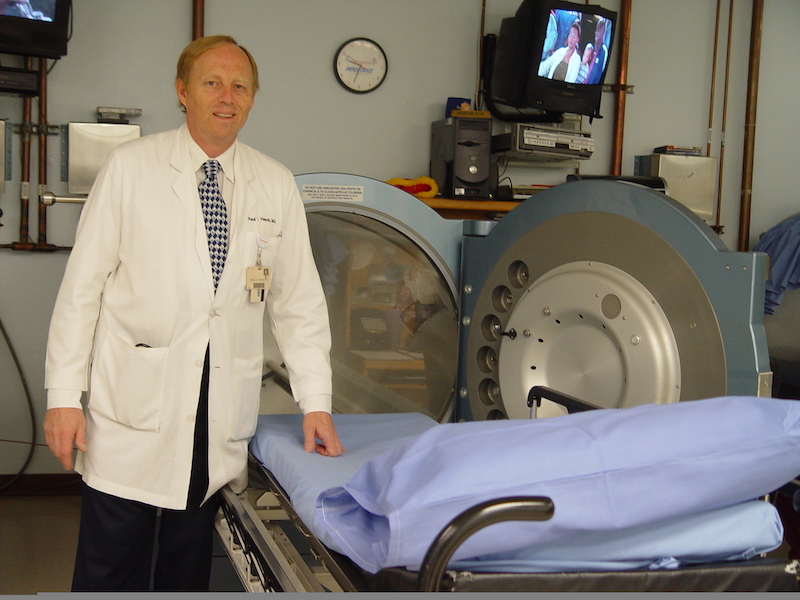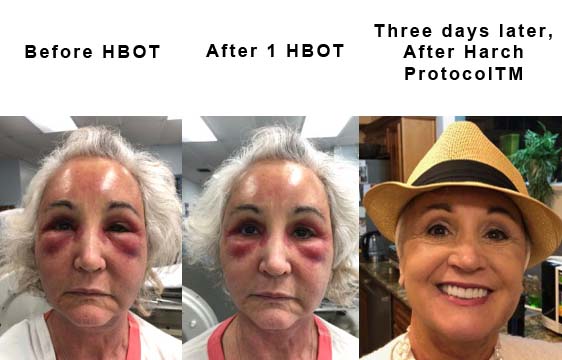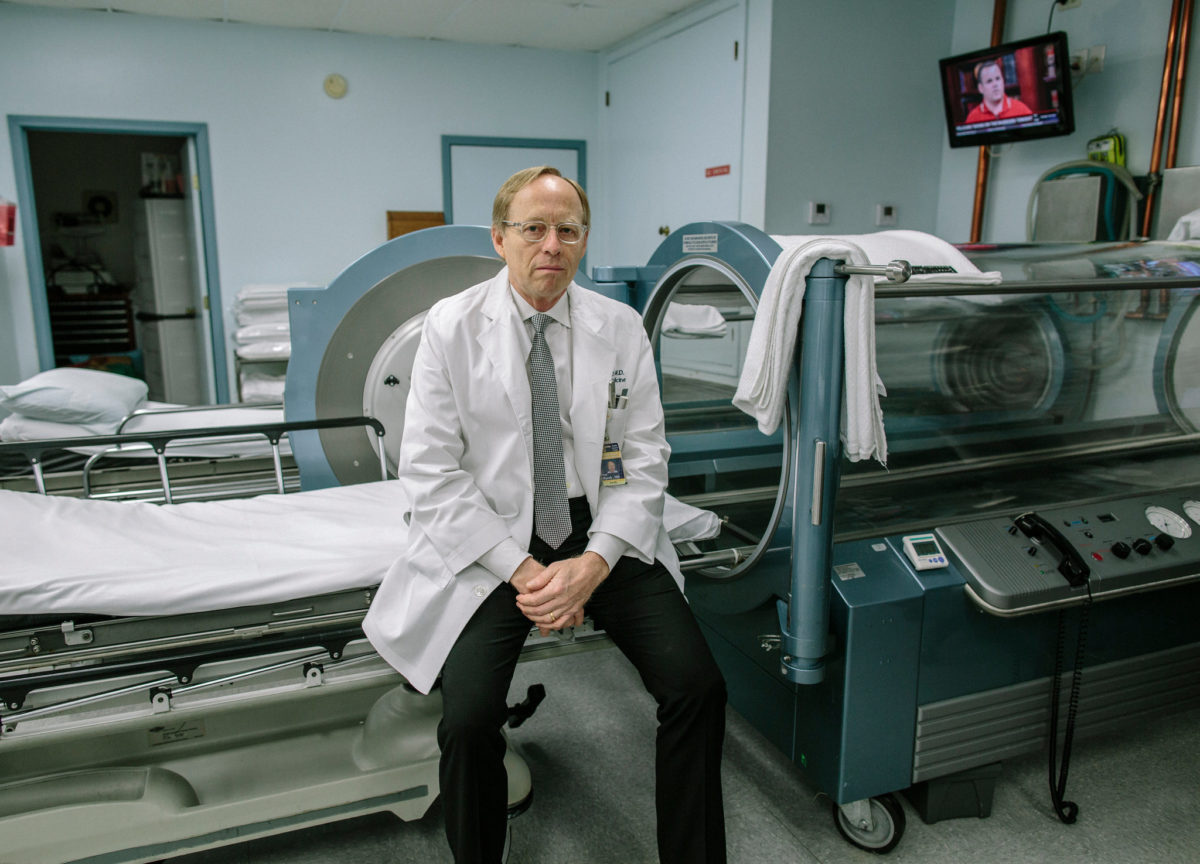What Conditions Can Hyperbaric Oxygen Therapy Treat?
There are a multitude of injuries and conditions that can be treated with hyperbaric oxygen therapy, or HBOT. Hyperbaric oxygen is used to treat all conditions which benefit from increased tissue oxygen availability, conditions in which inflammation is a significant contributor to the disease, as well as infections where it can be used for its antibiotic properties, either as the primary therapy or in conjunction with other drugs.
Can My Condition Be Treated With Oxygen Therapy?
Dr. Harch has successfully treated more than 100 different conditions with HBOT, including a wide range of chronic neurological conditions. It is very likely that oxygen therapy will be able to help you or your loved one.

These are the conditions that Dr. Harch treats most often:
Autism
HBOT is ideally suited for autism patients because autism is the result of wounding insults to the brain combined with inflammation. HBOT treats wounds and suppresses and treats inflammation. The benefits of HBOT for people with autism include improvements in social deficits, repetitive behaviors, sensory, intestinal, language, and emotional problems. In Dr. Harch’s experience, approximately 80% of his autistic patients will see improvement with HBOT.
Cerebral Palsy
HBOT can be a great way to improve a cerebral palsy patient’s quality of life when standard medical approaches are not working. Dr. Harch is the leader in hyperbaric oxygen treatment of cerebral palsy around the world, achieving success in nearly 90% of his CP patients. The first CP child treated with HBOT in North America was treated at Dr. Harch’s clinic in 1992. Since then, hundreds of CP children have been treated successfully with HBOT.
Drowning and Anoxic Brain Injury
Dr. Harch has been treating drowned children with HBOT since 1989. The benefits of hyperbaric oxygen treatment for drowning are numerous, though it is most effective when the treatment is delivered close to the time of the injury. Once considered an untreatable injury and amongst the most difficult diagnoses to treat with HBOT, Dr. Harch’s dosing approach to drowned patients has dramatically changed the ability to recover neurological function.
Migraine Headache
Dr. Harch has found that migraines resulting from brain injuries are very responsive to HBOT. When delivered at the time of an acute migraine, oxygen therapy helps by constricting the dilated blood vessels that cause the pulsing sensation.
Mild Cognitive Impairment (MCI) and Dementia
Hyperbaric oxygen treatment has been proven to help treat the symptoms of mild cognitive decline and even reverse the decline for many patients. Brain blood flow scans have shown improvement in blood flow in patients with MCI and dementia treated by HBOT. This is most likely because HBOT treats the underlying brain wounds responsible for cognitive decline and dementia.
Multiple Sclerosis
HBOT treats the wounds of multiple sclerosis, commonly called MS. Hyperbaric oxygen treatment of MS has been proven to reduce symptoms in patients, stabilize their function in the long term, and even increase their overall health and wellness. Many MS patients who undergo oxygen treatment experience increased mobility and energy, along with reduced urinary incontinence, involuntary movements, and fatigue.
Plastic or Cosmetic Surgery
After plastic or cosmetic surgery, nearly all patients experience agonizing side effects like swelling, bruising, and pain. Surgery inflicts trauma on a patient and this trauma results in wounds to the body. HBOT is a treatment for wounds. It can take time to heal after even a minor surgical procedure, but HBOT can help you heal faster because of its wound-healing effects. Many patients see improvements in bruising and swelling caused by plastic surgery after just a few HBOT treatments. Oxygen treatments can accelerate your recovery by several weeks or even months due to the body’s need for increased oxygen and HBOT’s ability to supply this oxygen.

Recovery from Surgery
While surgery is reparative and even curative, surgery causes wounding of your tissue. This wounding results in discomfort, pain, and other long-term effects like swelling, inflammation, and bruising. Hyperbaric oxygen treatment for surgical recovery is an effective way to reduce symptoms and heal more quickly after surgery of any kind. Through its effects on reduction of swelling and improvement of circulation, HBOT also reduces the chance of infection. In addition, patients also experience a brightening or wake-up effect from HBOT’s impact on the negative after-effects of anesthesia.
Sports Injuries and Sports Performance/Recovery
HBOT can also be used to treat sports injuries, which are any wounds to the body inflicted during a sporting event or game. When delivered as soon as possible after a sports injury, HBOT acts on the injured tissue to repair the wounds and decrease inflammation. For sports performance, HBOT is most effective after intense workouts in which anaerobic metabolism is incurred, like sprinting, intense weightlifting, speed workouts, etc. Used in this fashion, recovery time is accelerated and performance is improved. HBOT is increasing in popularity among athletes at all levels of competition and in all sports in order to aid sports performance and recovery.
Stroke
After a stroke, HBOT works on the affected brain tissue to salvage the tissue and restore function. Under Dr. Harch’s care, patients generally see a partial or complete reversal of the neurological deficit, depending on the time of intervention with HBOT and the type, size, and location of the stroke, All of these factors determine the dose of HBOT delivered to the patient, which is the key to successful treatment. Dr. Harch specializes in the correct dosing of oxygen treatment for his patients.
Traumatic Brain Injury (TBI)
HBOT is the only therapy that directly treats the underlying disease processes of TBI, which are decreased oxygen, decreased blood flow, swelling of the brain, constriction of blood vessels, acidosis, and anaerobic metabolism. HBOT can even decrease the chances of mortality following a TBI. For patients who have persistent post-concussion syndrome, HBOT is the best-known effective therapy, also known as “Evidence-Based Medicine.” Dr. Harch is the only physician to have performed HBOT research on both civilians and veterans with TBI, successfully relieving symptoms in both civilian and military blast-injured patients.

Learn more about the conditions that Dr. Harch treats most often:
Other conditions Dr Harch commonly treats with hyperbaric oxygen therapy are:
Acquired Brain Injury (ABI)
Anesthesia Injury
Autoimmune Disorders
Arthritis
Birth Injury
Brain Aneurysm
Brain Injury caused by Substance Abuse
Brain Injury from Chemotherapy (“Chemo Brain”)
Brain Injury from Radiation
Central Retinal Artery Occlusion
Concussion
Chronic Carbon Monoxide Poisoning
Chronic Decompression Sickness
Chronic Fatigue Syndrome
Complex Regional Pain Syndrome
Depression caused by Brain Injury
Fibromyalgia
Hashimotos
Hypoxic Ischemic Encephalopathy
Inflammatory Conditions
Lyme Disease
Mitochondrial Disorders
Mold Toxicity
Myofascial Pain Syndrome
Near-hanging
Peripheral Neuropathy
Post Concussion Syndrome
Post Traumatic Stress Disorder
Reflex Sympathetic Dystrophy Syndrome
Shaken Baby Syndrome
Spinal Cord Compression Injury
Tinnitus
Toxic Brain Injury
and more…
These are common conditions that are treated with HBOT:
Air or Gas Embolism
Acute Carbon Monoxide Poisoning
Compartment Syndrome/Crush Injury/Other Traumatic Ischemias
Acute Decompression Sickness (The Bends)
Diabetic and Selected Wounds
Exceptional Blood Loss (Anemia)
Gas Gangrene
Intracranial Abscess
Necrotizing Soft Tissue Infection
Osteoradionecrosis and Radiation Tissue Damage
Osteomyelitis (Refractory)
Skin Grafts and (Comprimised) Flaps
Thermal Burns
What if My Condition or Injury Is Not Listed?
If you are unable to find the condition for which you are seeking treatment, don’t worry. Dr. Harch has treated more than 100 different conditions with hyperbaric oxygen therapy. Please Contact Us to see if you are a good candidate for HBOT, whether your condition or injury is listed on this page or not.
